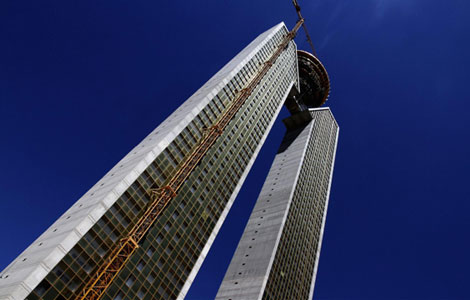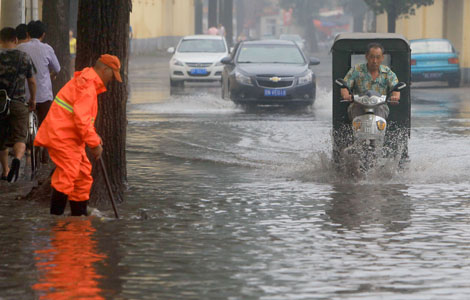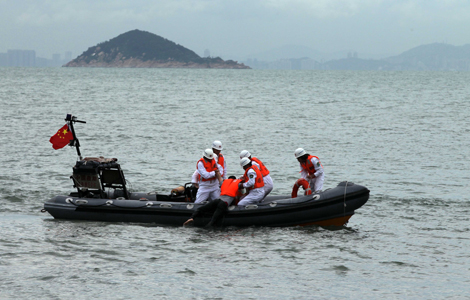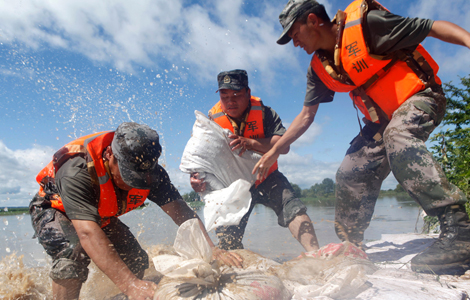Lesson still to be learned
Updated: 2013-08-12 07:12
By Li Wei (China Daily)
|
||||||||
Without soul-searching it is impossible for an unrepentant Japan to win the trust of its East Asian neighbors
Japanese Prime Minister Shinzo Abe has declined to say whether he will visit the Yasukuni Shrine on Aug 15, the anniversary of Japan's surrender in World War II, but he has made it clear that he will not stop his cabinet ministers from visiting the war-linked shrine on that day. Tomomi Inada, the minister in charge of administrative reform, has received approval from the prime minister's office after voicing his intention to visit the shrine.
Visits to the Yasukuni Shrine by Japanese cabinet members and politicians on Aug 15 will blatantly challenge the current international order and justice, and seriously hurt the feelings of the people of the Asian countries that suffered from Japanese atrocities and could have serious consequences for the region's peace and stability.
Over the last 68 years, there have always been sharply divided views in Japan about its wartime past. On the one hand, a number of influential politicians in Japan, such as Tomiichi Murayama and Yohei Kono, have straightforwardly apologized for Japan's colonial rule and aggression, which caused tremendous damage and suffering to the people of many countries. On the other hand, we also hear frequent denials from right-wing conservatives, who question the Tokyo Trials and even attempt to claim there is no agreed definition of aggression.
The international community has been shocked by Abe's revisionist remarks claiming that the definition of aggression has yet to be firmly established by academic experts or the international community, Osaka Mayor Toru Hashimoto's comments that "comfort women" were necessary, and Finance Minister Taro Aso's remarks suggesting Japan should follow the Nazi example and change the country's constitution stealthily and without public debate. The words and deeds of these rightist politicians do not represent the will of Japanese people as a whole, so why have their intemperate words and actions not caused a crisis of confidence in the government or been morally condemned?
First, Emperor Hirohito's Surrender Rescript alone could hardly sweep away the country's ideological heritage of nearly a century, and the thorough and serious contrition in spirit advocated by left-wing intellectuals over the acts of aggression has not materialized in Japan till now.
Second, for the sake of its geopolitical needs and convenience, the United States did not put Hirohito on trial for war crimes. His preservation as emperor after the war resulted in an incomplete reckoning of the country's accountability and the lack of spiritual soul-searching, which Japanese scholar Masao Maruyama has termed as the "structure of irresponsibility".
On Aug 15, 1945, Japan announced to the whole world its acceptance of the terms of the Potsdam Declaration, which specifies the unconditional surrender of Japan. Japanese war criminals were brought to justice for conventional war crimes, crimes against peace and crimes against humanity by the International Military Tribunal for the Far East based on indisputable evidence, and the nature of Japan's history of wartime aggression is crystal clear. The postwar international order was established on the basis of stopping aggression and defending the newly won peace. The historical conclusion and trend cannot be reversed.
When it comes to reflection on its wartime past, Germany is regarded as the model penitent. After the war, Germany abandoned the Nazi flag and songs, and the German authorities have spared no effort to expose, criticize and fight Nazi crimes. The introspection of the German nation is in an absolute sense. Japan, on the other hand, is impenitent and its apologies have been superficial and pale, and often undermined by a stream of revisionist remarks.
Today, regardless of the great efforts Tokyo has made to grow with the world, people have every reason to worry about the ongoing military development of Japan, as the country is still refusing to face up squarely to its wartime history.
During the 1980s when the Japanese economy was at its peak, Japan's strategic elite set the goal of being a "normal" state so as to increase its voice in world politics and get rid of the postwar system. Since the 1990s, Japan has made becoming a permanent member of the United Nations Security Council its foreign policy goal, continued to promote the process of becoming a normal state and begun to engage in the field of international security affairs.
During the past decade, by taking advantage of the US' global anti-terrorism campaign and its strategic rebalancing toward the Asia-Pacific, Japan, as the US' closest ally, achieved the transformation of its security and defense strategy. It is moving toward relaxing the so-called three principles on arms exports and accelerating the pace of lifting its ban on the right to collective self-defense.
Military independence is seen as a necessity to achieve the goal of being a normal state, so the Abe administration holds it necessary to develop its military capabilities.
The international community, especially Japan's neighbors in Asia, should heighten their vigilance over the direction of Japan's development and strategic transformation of its defense and security policies.
It is difficult for an unrepentant Japan to win the trust and understanding of the international community, especially its East Asian neighbors, who suffered most from Japanese aggression and subjugation.
Only when Japan overcomes itself, faces up to history squarely and learns from history, can a historical reconciliation in East Asia come true.
The author is director of the Institute of Japanese Studies at the Chinese Academy of Social Sciences.
(China Daily 08/12/2013 page8)

 Celebrating Chinese Valentine's Day
Celebrating Chinese Valentine's Day
 Questioning China's achievements
Questioning China's achievements
 Spanish skyscraper forgets elevator
Spanish skyscraper forgets elevator
 Beijing rainstorm cancels flights, kills airport worker
Beijing rainstorm cancels flights, kills airport worker
 Highs and lows of marine rescue
Highs and lows of marine rescue
 Lin Dan wins Olympic final rematch over injured Lee
Lin Dan wins Olympic final rematch over injured Lee
 Northeast China braces for major floods
Northeast China braces for major floods
 High-heeled, well heeled
High-heeled, well heeled
Most Viewed
Editor's Picks

|

|

|

|

|

|
Today's Top News
Fonterra gets further hit as it recalls milk powder
Chinese take a shine to fine china from UK
New green policy gives industries a big boost
Snowden's father to leave for Russia
Northeast China braces for major floods
Launches highlight India's ambitions
Chinese put on alert in Afghanistan
Questioning China's achievements
US Weekly

|

|




